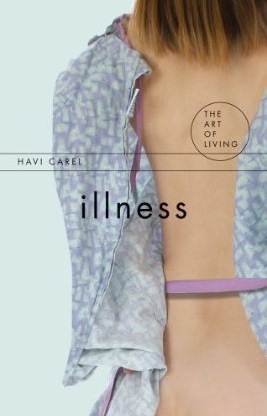I don’t have a lot of time to read these days, but today I want to talk to you about possibly one of the most important books in my collection.
It is a women’s honest account of living with an incurable and life-threatening chronic illness (lymphangioleiomyomatosis). It describes what we can all learn through the process of illness.
Most importantly in this book Carel talks honestly about our perception of death, our collective frailty through chronic illness and as such importance of living in the present, all of this with a rationality of an academic, evidenced through the framework of philosophical understanding.
It is quite frankly a required read for anyone suffering with chronic illness. Havi Carel touches on those subjects that you bury deepest inside yourself and that you find most emotive and painful. Her words recognises and soothes the emotional pain in a way only someone who carries the same burden can.
It is a great comfort to me on the worst days of my chronic illness, and I want to share some of it with you.
Acceptance
I found that I had to reinvent my life. I had to give up some friendships. I had to learn to be tough on myself and sometimes rude to others.
– Havi Carel
I was fortunate to discover Havi Carel’s Illness by complete chance. I was browsing the shelves of a second hand book shop and discovered it on a shelf in the health section.
Someone had neatly highlighted key passages they found interesting in thin black marker. I found as I read and re-read the book many of the phases they had highlighted were the ones that I found most comforting, interesting and useful. I can’t help but wonder if this person purchased this book with the same sad exhaustion that I did, that they found the words relieved the same tired ache from within them too.
Reading it alongside this anonymous person adds a strange source of additional comfort to me each time I read it, and it’s some of their highlights I will share with you.
My only wish now is to hang on to what I have now: being alive, having a moderate quality of life, doing some of the things I love. That’s plenty, I tell myself. And it is this veneer of normality, this slightly sad and inappropriate sense of luck, that sustains me in my illness.
– Havi Carel
Carel has a beautiful way with words, moving to the heart of the issue of illness, moving away from the clinical understanding presented to us by doctors and focusing hugely on illnesses personal impact. Hers is a more human way to rationalise the sense of loss, the what might have beens, and the sense of grief (and eventually) the acceptance we feel.
Eventually, my body learned to stop trying. It learned to give up its habits and form new ones.
– Havi Carel
As as lecturer of philosophy she uses philosophical statements and ideas to provide context to the very subjective issues surrounding illness. She cites philosopher’s views and theories to balance and counteract the medical and social norms that are often used to describe or talk about illness. There is a great deal of citation and philosophical explanation in this book, as such it may not be to everyone’s cup of tea.
However…
The philosophy is refreshing
I’ll say this about the philosophy in the book though. I don’t even have a passing interest in philosophy, but sometimes illness requires us to look at things in a different ways, and her examples suit the content and context of this book and are well-explained in words anyone could understand. Her work is beautiful. It continues to refresh my understanding of illness and her understanding of philosophy (and plain English examples) actually encouraged me to look into the subject more.
Visible illness or disability often becomes the elephant in the room. It is seen as something that is not to be commented on or mentioned by polite people. But at the same time the condition challenges the normal interaction and makes not talking about it difficult, almost impossible.
– Havi Carel
Her chapters about social conventions and illness are particularly illuminating. She has a unique ability to describe very common experiences we’ve all shared in such a genuine way, with a real sense of purpose rather than bitterness. As such I would also recommend this book to someone who you care about that wants to understand more about chronic illness.
Carel explains despite the universal nature of illness and death, how we can still find a way to carve out some happiness against supreme odds.
Remarkable
Every single chapter in this book is a source of comfort, but it can at times be a hard read in places too. Her story talks about the diagnosis of a life-threatening illness, one that usually has a prognosis of about ten years. Yet Carel talks about her perception of illness and death in the matter of fact way that we do when we have a chronic illness. There are no secrets in our community of sufferers, there is nothing to hide and no pretence as there would be with others.
The bitterness in me has nowhere to go, It has no place, no name. It is verboten. The strict limitations on what I may or not say even to my closest friends manoeuvre me into a more socially palatable position: being courageous. How brave I am. How uncomplaining.
– Havi Carel
Havi Carel’s Illness is a remarkable read. It is my chronic illness mainstay. My quiet respite for the very, very worst weeks, and it comes highly recommended from me.
